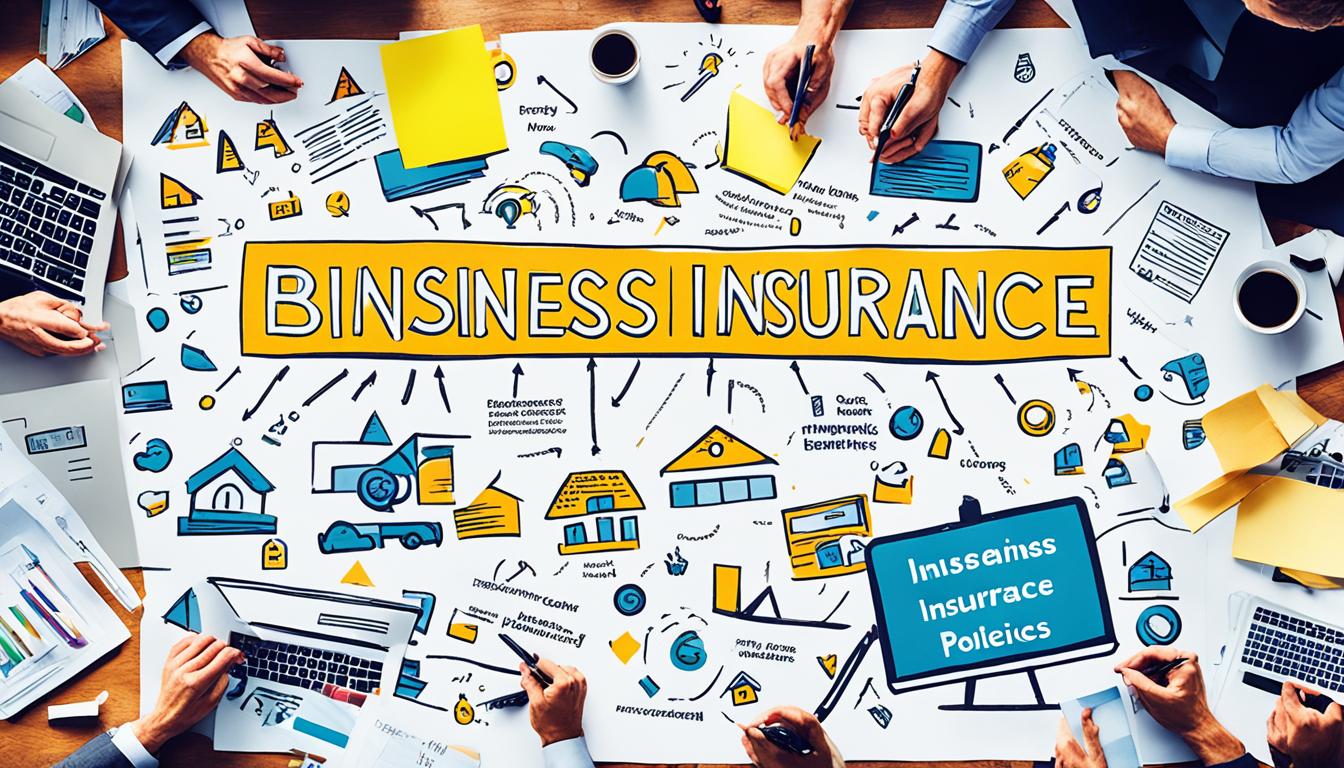In today’s dynamic and ever-changing business landscape, it is crucial to prioritize risk management for sustainable growth and success. A vital component of risk management is securing adequate business insurance coverage, which acts as a financial safeguard against unpredictable risks. However, with the wide array of insurance options available, navigating the complex landscape of business insurance policies can be overwhelming.
As a business owner, it is essential to understand the key insurance policies that can protect your assets and operations. From comprehensive coverage to specialized options, choosing the right insurance plans can ensure your business is well-protected and prepared for any unforeseen circumstances.
Key Takeaways:
- Business insurance is crucial for safeguarding your enterprise against unpredictable risks.
- Understanding the different types of insurance coverage options is essential for choosing the right policies.
- Comprehensive business insurance plans offer holistic protection for assets and operations.
- Key insurance policies every business owner should consider include general liability coverage, property insurance, and professional liability insurance.
- Partnering with a reputable business insurance broker can ensure tailored insurance solutions, assistance with regulatory compliance, and strategic risk management.
Understanding Business Insurance
Business insurance serves as a vital financial safeguard against unpredictable risks for businesses of all sizes. It encompasses a variety of coverage options that help protect assets, operations, and mitigate potential liabilities.
Liability insurance is a fundamental aspect of business insurance. It provides coverage for claims related to bodily injury or property damage caused by your business operations. This includes situations where customers, clients, or third parties suffer harm due to your products, services, or actions. Liability insurance ensures that your business has the financial resources to address legal expenses, settlements, and judgments.
Property insurance is another essential component of business insurance. It protects physical assets, such as buildings, offices, equipment, and inventory, against perils like fire, theft, and natural disasters. In the unfortunate event of damage or loss, property insurance provides the necessary coverage for repairs and replacements, allowing your business to quickly recover and resume operations.
However, business insurance goes beyond general liability and property coverage. Various industries also require specialized coverage tailored to specific risks. One such example is professional liability insurance, also known as errors and omissions insurance, which is crucial for businesses that provide professional services. It safeguards against claims of negligence or inadequate service resulting in financial loss for clients.
As every business has unique risks, it is important to assess the specific needs and activities of your enterprise. By evaluating the scale and scope of your operations, you can identify the most appropriate insurance coverage. In this sense, tailored insurance packages are designed to meet the unique requirements of different businesses, ensuring comprehensive protection and peace of mind.
Having a comprehensive understanding of business insurance is crucial for safeguarding your enterprise from unforeseen risks. By obtaining the right liability and property coverage, as well as specialized insurance options, you can protect your business assets and operations while minimizing potential liabilities.
At XYZ Insurance Brokers, we understand the complexities of business insurance and the importance of tailored coverage. Our team of experienced professionals can help you navigate the insurance landscape and design a comprehensive insurance plan that aligns with your specific needs. Contact us today to learn more about how we can assist you in safeguarding your business.
Types of Business Insurance
When it comes to protecting your business, having the right insurance coverage is essential. Business insurance helps safeguard your company against various risks and liabilities that can arise in the course of operations. Here are some of the most common types of business insurance:
1. General Liability Coverage
General liability insurance provides coverage for third-party claims of bodily injury, property damage, and personal injury. This type of insurance protects your business from financial loss if someone sues you for accidents or injuries that occur on your premises or as a result of your business activities.
2. Property Insurance
Property insurance is designed to protect your business assets, including buildings, equipment, inventory, and furniture, against loss or damage due to events such as fire, theft, vandalism, or natural disasters. It provides financial compensation to help you repair or replace damaged property and get your business back on track.

3. Business Interruption Insurance
Business interruption insurance provides coverage for lost income and ongoing expenses in the event that your business operations are interrupted or suspended due to a covered peril. It helps you recover financially by compensating for the income you would have earned during the interruption period and covering essential expenses like rent, utilities, and salaries.
4. Workers’ Compensation Insurance
Workers’ compensation insurance is a legal requirement in most states and provides coverage for medical expenses and lost wages if an employee suffers a work-related injury or illness. It helps protect your business from lawsuits by providing benefits to injured employees and covering their medical costs and rehabilitation.
5. Professional Liability Insurance
Professional liability insurance, also known as errors and omissions (E&O) insurance, is essential for service-based businesses or professionals who provide guidance or advice to clients. It protects against claims of negligence, errors, or omissions, which can lead to lawsuits and financial losses.
6. Cyber Liability Insurance
In today’s digital age, cyber liability insurance is crucial for businesses that store sensitive customer information, conduct online transactions, or rely on computer networks. It provides coverage for losses resulting from cyberattacks, data breaches, or other cyber-related incidents, including legal expenses, notification costs, and potential damages.
7. Industry-Specific Insurance Options
Depending on your industry, there may be specialized insurance options tailored to address the unique risks associated with your business sector. Examples include professional indemnity insurance for consultants, product liability insurance for manufacturers, and directors and officers (D&O) insurance for executives. Consulting with a business insurance broker can help you identify and secure the specific coverage you need.
It’s important to assess your business’s risks and consult with a reputable business insurance broker or agent to determine the most suitable combination of coverages. By having the right types of insurance in place, you can protect your business, employees, and assets, ensuring peace of mind and long-term viability.
Legal Obligation Compliance
When it comes to business insurance, legal obligation compliance is of utmost importance. In order to meet industry-specific requirements and avoid potential penalties, businesses are often required to have certain types of insurance coverage in place. Two key examples of mandatory business insurance include Workers’ Compensation Insurance and third-party liability insurance.
Workers’ Compensation Insurance is designed to provide financial protection in the event that an employee sustains an injury or becomes ill due to work-related circumstances. It covers medical expenses, lost wages, and rehabilitation costs, ensuring that employees receive the necessary support and compensation they deserve. By having Workers’ Compensation Insurance, businesses not only fulfill their legal obligations but also demonstrate their commitment to the well-being and safety of their workforce.
Third-party liability insurance is another crucial type of coverage that is often legally required. This insurance protects businesses against claims or lawsuits arising from third parties, such as customers or vendors, who may suffer bodily injury, property damage, or financial losses as a result of the business’s operations or products. Having third-party liability insurance is essential for businesses to mitigate the financial risks associated with such claims and ensure that they can fulfill their legal obligations to compensate injured parties.
By prioritizing legal obligation compliance and obtaining mandatory business insurance, businesses can operate with confidence, knowing that they have the necessary coverage to protect their employees, customers, and overall operations.

Commercial Property Insurance
When it comes to protecting your business, Commercial Property Insurance plays a vital role. This type of insurance provides comprehensive coverage for your physical assets, safeguarding them against perils such as fire, theft, and natural disasters.
With Business Property Insurance, you can rest assured that your property will be covered in case of damage or loss. This coverage includes the cost of repairing or replacing damaged property, as well as compensating for any loss of income during business interruptions.
While Commercial Property Insurance offers extensive coverage, it’s important to note that there may be certain exclusions. For example, it may not cover perils like earthquakes or intentional acts. Therefore, it’s crucial to review the policy carefully to understand the specifics of the coverage.
The cost of Commercial Property Insurance can vary based on several factors. The type of business, location, value of assets, coverage limits, and industry risk all contribute to determining the premium you will pay.

In conclusion, Commercial Property Insurance, also known as Business Property Insurance, provides comprehensive coverage for your physical assets. By understanding the coverage specifics, exclusions, and cost factors, you can make informed decisions to protect your business and its valuable assets.
Conclusion
Business insurance brokers are indispensable when it comes to navigating the intricacies of the insurance landscape. With their expertise, they provide tailored insurance solutions that address the specific needs of businesses. Whether it’s finding the right coverage, assisting with regulatory compliance, or advocating for timely claims resolution, brokers ensure that businesses are well-protected.
Moreover, business insurance brokers offer strategic risk management advice to help organizations proactively manage and mitigate risks. By partnering with a reputable broker, businesses can safeguard their assets and operations, ensuring long-term resilience and success.
When it comes to business insurance, it’s crucial to have a trusted expert by your side. Business insurance brokers offer tailored insurance solutions, ensure regulatory compliance, provide claims resolution support, and offer strategic risk management advice—all to protect your business and its future.




No comments! Be the first commenter?